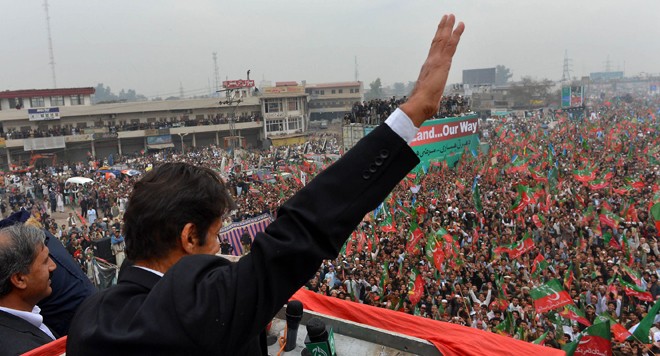

The May 11 rally of the PTI at D Chowk in Islamabad was oh-so-filmi in the way it put out its angry, not-so-young hero, his aides (in a supporting role, of course), interspersed with songs that provided some relief to the audience at large. It had all the ingredients of a super-hit, except that it was without a heroine.
There has not been a dull moment for the Pakistan Tehreek-e-Insaf (PTI) since last year’s general elections. The top leadership has been busy calling the elections rigged. It has been in a constant protest mode.
No wonder the party supporters attending the D Chowk rally reflected the same sentiment. "We are here on the call of our leader against election rigging. We are also here to protest against the role of Geo TV in election rigging," said 28-year-old Umar Khan from Peshawar.
Others said that the motive of the rally was to start recounting in four constituencies and to put pressure on the PML-N government to start work on public issues. "Nawaz Sharif came to power on the promise to solve energy crisis and economy. Both are in bad shape even after one year. They should resign and conduct new elections," said 35-year-old Ghulam Mustafa from Islamabad.
Apparently, some party members resisted the rally. "It was our first major rally after last year’s general elections. We had informed the party leadership that gusto and passion among the supporters was missing," says a senior member of the PTI on condition of anonymity. "The situation is not the same as last year when we were able to pull huge, charged crowds. But not anymore. In fact, many have also started questioning the performance of our party’s government in KP."
According to him, the party first needs to focus on delivering in KP.
Some political pundits think Imran’s speech was directionless. "He accused everyone in his speech. It is hard to understand the direction in which he is pointing his finger. His charter of demands has brought little clarity on what he wants," says Khawar Ghumman, senior political journalist based at Islamabad, adding that Imran has presented a range of immediate, mid-term and long-term demands that range from recounting in the four constituencies to the resignation of the election commission members to fight against a media group.
It is difficult to understand why the PTI needs to plan a series of rallies across the country to press for its demand when it has a strong presence in the parliament. It can try to introduce change in the law to reform the electoral process. In Pakistan, under the constitution, this is the only legal way to reform the election commission. There is no other way.
"Dr Tahirul Qadri had a sit-in before last elections. He presented the one-point agenda to reform the Election Commission of Pakistan. The then government signed a ‘document’ with him and promised to look into his demands. But, nothing happened because only parliament can reform the electoral process," says Ghumman.
The one good thing that the PTI has started of late is meeting with other opposition political parties. "Some uncertainty has already started prevailing among the PML-N ranks. They cannot afford recounting in four constituencies. It would open a Pandorabox and would put a question mark on the whole parliament," he adds.
The political temperature of the capital has been on the rise since the last few weeks. New political alliances are being made. Imran Khan’s party which is already in alliance with Sheikh Rasheed’s Awami Muslim Leaque has approached the PML-Q.
Not too far away from D Chowk, in Rawalpindi, Dr Tahirul Qadri delivered a fiery speech against the "corrupt government and electoral system" of Pakistan from Canada via a video link. In effect, Imran Khan supported Qadri’s political agenda to end the current system of democracy.
Imran’s stance to many is rather confusing -- on one hand his party forms the provincial government in KP, works closely with the government on the issue of talking to the TTP (in fact, the first team of negotiators representing the government had a member nominated by the KP government), while on the other it sides with the powers which are lobbying for rolling up this system.
The two rallies -- in Islamabad and Rawalpindi -- last Sunday coincided with the developing tension between the civilians and the military. A senior bureaucrat in Islamabad says that there is a clear divide among institutions in Islamabad -- "It was never so clear during the PPP’s five year term. Some parties like the PTI may be trying to exploit the divide".
He thinks the military and civilian leadership do not trust each other on several key issues, and that "the divide has become more evident in the aftermath of the attack on Hamid Mir."
In capital, people have already started talking about a government of technocrats for three year on the pretext that the present set-up is not delivering.
On May 14, 2014, Mahmood Khan Achakzai, chief of the Pakhthunkhwa Milli Awami Party and an ally of the PML-N government while addressing the National Assembly warned of the dangerous plots that ranged from trapping the military in an ill-conceived fight with the Taliban to the establishment of a regime of technocrats.
"The present parliament will be Pakistan’s last if any attempt was made to tamper with it and if we also do not adopt the right attitudes," he said, adding the prime minister should have called all the generals and other stakeholders, and made it clear that decisions would be taken by politicians.